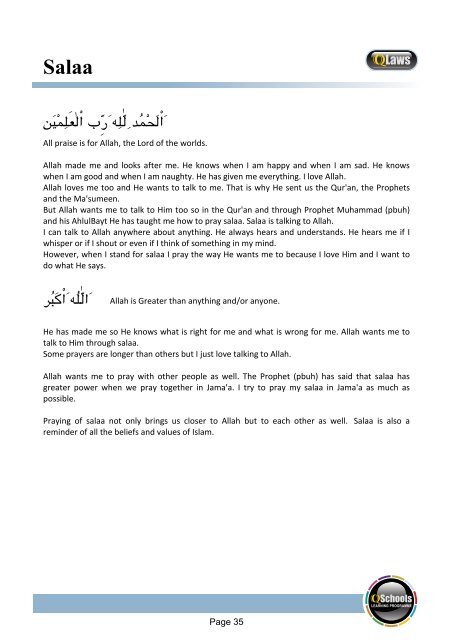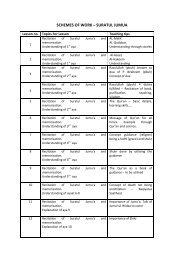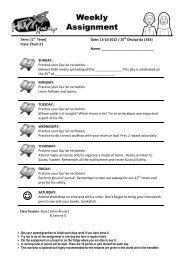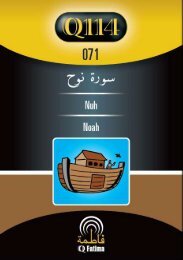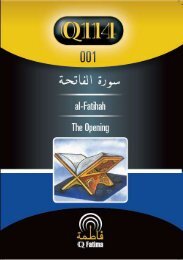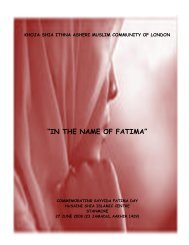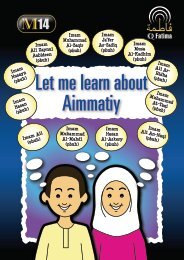Actions & recitations of salaa - Hujjat Workshop
Actions & recitations of salaa - Hujjat Workshop
Actions & recitations of salaa - Hujjat Workshop
Create successful ePaper yourself
Turn your PDF publications into a flip-book with our unique Google optimized e-Paper software.
Salaa<br />
QLaws<br />
ÅäÎæÀê¼ò¨{»ôA Løéiä Éê¼}é»ê fåÀæZä»ôAä<br />
All praise is for Allah, the Lord <strong>of</strong> the worlds.<br />
Allah made me and looks after me. He knows when I am happy and when I am sad. He knows<br />
when I am good and when I am naughty. He has given me everything. I love Allah.<br />
Allah loves me too and He wants to talk to me. That is why He sent us the Qur'an, the Prophets<br />
and the Ma'sumeen.<br />
But Allah wants me to talk to Him too so in the Qur'an and through Prophet Muhammad (pbuh)<br />
and his AhlulBayt He has taught me how to pray <strong>salaa</strong>. Salaa is talking to Allah.<br />
I can talk to Allah anywhere about anything. He always hears and understands. He hears me if I<br />
whisper or if I shout or even if I think <strong>of</strong> something in my mind.<br />
However, when I stand for <strong>salaa</strong> I pray the way He wants me to because I love Him and I want to<br />
do what He says.<br />
jåJä·ôAä Éå¼}é»Aä Allah is Greater than anything and/or anyone.<br />
He has made me so He knows what is right for me and what is wrong for me. Allah wants me to<br />
talk to Him through <strong>salaa</strong>.<br />
Some prayers are longer than others but I just love talking to Allah.<br />
Allah wants me to pray with other people as well. The Prophet (pbuh) has said that <strong>salaa</strong> has<br />
greater power when we pray together in Jama'a. I try to pray my <strong>salaa</strong> in Jama'a as much as<br />
possible.<br />
Praying <strong>of</strong> <strong>salaa</strong> not only brings us closer to Allah but to each other as well. Salaa is also a<br />
reminder <strong>of</strong> all the beliefs and values <strong>of</strong> Islam.<br />
QSchools<br />
LEARNING PROGRAMME<br />
Page 35
umber <strong>of</strong> Rakaats and<br />
Times <strong>of</strong> Salaa (amaz)<br />
QLaws<br />
I pray five Salawat (plural <strong>of</strong> <strong>salaa</strong>) three times a day. Each <strong>salaa</strong> is divided into rakaats. In each<br />
rakaat, I do qiyam, rukoo, two sajadaat and juloos.<br />
1. Fajr Salaa – Early in the morning just as the night ends, I pray 2 rakaats.<br />
2. Zhuhr and ‘Asr <strong>salaa</strong> – At midday (halfway through the day), I pray Zhuhr followed by ‘Asr<br />
<strong>salaa</strong>. (Zhuhrayn)<br />
4 rakaats for Zhuhr and 4 rakaats for ‘Asr.<br />
3. Maghrib and Eisha <strong>salaa</strong> – Just as the day ends and the night begins, I pray Maghrib<br />
followed by Eisha <strong>salaa</strong>. (Maghribayn)<br />
3 rakaats for Maghrib and 4 rakaats for Eisha.<br />
QSchools<br />
LEARNING PROGRAMME<br />
Page 38
This is how I Pray Salaa (amaz)<br />
QLaws<br />
I say my niyya. For example, if I am praying Maghrib <strong>salaa</strong>, I say: “I am praying 3 rakaats for<br />
Salaatul Maghrib –<br />
Qurbatan ilallah – êÉé}¼»A Óò»êA çÒäIæjå³<br />
(To obey Allah and to get closer to Him).<br />
I raise my hands up to my ears for takbeeratul ihram, and I say<br />
takbeer: “Allahu Akber jäJô·òA åÉé}¼»òA<br />
(Allah is Greater than anything and anyone).<br />
Now I stand still for qiyam and looking at the ground (mohr, turbat). I<br />
recite Suratul Fatiha and one other sura from the Qur’an.<br />
I then say “Allahu Akber” and then go to rukoo and looking between<br />
my feet, I recite:<br />
“Subhana rabbiyal ‘adheemi wa bihamdih<br />
êÊêfæÀäZøI äË øÁæÎê¤ä¨ô»A äÏðIäi äÆBäZæJåm<br />
(Glory be to my Rabb, the Great and praise be to Him).<br />
I stand up from rukoo for qiyam and I recite:<br />
“Samia’llahu liman hamida<br />
êÊäfêÀäY æÅäÀê» åÉé}¼»A ä©êÀäm<br />
(Allah hears he/she who praises Him).<br />
QSchools<br />
LEARNING PROGRAMME<br />
Page 39
I then say “Allahu Akber” and then go to sijda making sure that the seven<br />
parts <strong>of</strong> my body touch the ground – My forehead, two palms, two knees,<br />
and the two tips <strong>of</strong> my toes. In sijda, I recite:<br />
“Subhana rabbiyal ‘alaa wa bihamdi<br />
êÊêfæÀäZøI äË Ó}¼æ§äôÜA äÏðIäi äÆBäZæJåm<br />
(Glory be to my Rabb, the most High and praise be to Him).<br />
I sit up from sijda for juloos with my legs tucked under me and looking at my<br />
lap, I say:<br />
“Astaghfirullaha rabbiy wa atubu ilayh<br />
êÉæÎò»êA åLæÌåMòA äË æÏðIäi äÉé}¼»A åjê°æ¬äNæmòA<br />
(I see forgiveness from Allah, my Rabb, and I turn repentant to Him )<br />
I go back to sijda once more and I recite:<br />
“Subhana rabbiyal ‘alaa wa bihamdi<br />
êÊêfæÀäZøI äË Ó}¼æ§äôÜA äÏðIäi äÆBäZæJåm<br />
(Glory be to my Rabb, the most High and praise be to Him).<br />
I sit up from sijda for juloos and recite:<br />
“Allahu Akber - jäJô·òA åÉé}¼»òA<br />
(Allah is Greater than anything and anyone)<br />
Now I stand up for qiyam <strong>of</strong> the second rakaat. Whilst in the process <strong>of</strong><br />
standing up, I recite: “Bihawlillahi wa quwwatihi aqumu wa aq’ud<br />
åfå¨æ³òA äË åÂæÌå³òA êÉêMìÌå³ äË êÉé}¼»A ø¾æÌäZøI<br />
(With the power and strength <strong>of</strong> Allah, I stand and sit).<br />
I stand for qiyam and recite Suratul Fatiha and Suratul Ikhlas.<br />
QSchools<br />
LEARNING PROGRAMME<br />
Page 40
ë<br />
I raise my hands for qunoot and recite:<br />
“Rabbanaa aatinaa fid dunya hasanataw wa fil aakhirati hasanataw waqinaa<br />
adhaaban naar. Allahumma salli ‘alaa Muhammadiw wa aali Muhammad<br />
ø äLAähä§ BäÄê³ ìË çÒäÄänäY êÑäjêa{ôÜA Óê¯ ìË çÒäÄänäYBäÎæÃåf»A Óê¯ BäÄêM}A BäÄìIäi<br />
iBìÄ»A<br />
(Our Rabb. Grant us good in this world and good in the hereafter, and save us<br />
from the punishment <strong>of</strong> the fire)<br />
ëfìÀäZå¿ ø¾}A ìË ëfìÀäZå¿ Ó}¼ä§ þ½äu ìÁåÈé}¼»òA<br />
I then do rukoo and the two sajadaat (sijda’s) just like the first raka’at.<br />
When I sit for juloos after the second sijda, I say Takbeer “Allahu Akber” and<br />
then recite Tashahhud:<br />
“Ash hadu anl laa ilaaha illallahu wahdahu laa sharika lah, wa ash hadu anna<br />
Muhammadan ‘abdahu wa rasuluh, Allahumma salli ‘alaa Muhammadiw wa<br />
aali Muhammad<br />
åÉò» ò¹æÍøjäq òÜ åÊäfæYäË åÉé}¼»A úÜêA äÉ}»êA ÷à æÆòA åfäÈæqòA<br />
åÉó»æÌåmäi äË åÊåfæJä§ AçfìÀäZå¿ ìÆòA åfäÈæqòA äË<br />
fìÀäZå¿ ø¾}A ìË ëfìÀäZå¿ Ó}¼ä§ þ½äu ìÁåÈé}¼»òA<br />
(I bear witness that there is no god except Allah, the only One and there is no partner for Him, and<br />
I bear witness that Muhammad is His slave and His messenger. O Allah! Send blessings on<br />
Muhammad and his ahlulbayt).<br />
After the tashahhud, I stand up for qiyam for the third raka’t. In the process <strong>of</strong> standing, I recite:<br />
“Bihawlillahi wa quwwatihi aqumu wa aq’ud - åfå¨æ³òA äË åÂæÌå³òA êÉêMìÌå³ äË êÉé}¼»A ø¾æÌäZøI - (With<br />
the power and strength <strong>of</strong> Allah, I stand and sit).<br />
QSchools<br />
LEARNING PROGRAMME<br />
Page 41
In qiyam <strong>of</strong> the third raka’t, I recite tasbihaat e arba’a three times: “Subhaanallahi walhamdu<br />
lillahi wa laa ilaaha illallahu wallahu akber -<br />
åjäJô·òA åÉé}¼»A äË åÉé}¼»A úÜêA äÉ}»êA òÜ äË êÉé}¼ê» åfæÀäZô»A äË êÉé}¼»A äÆBäZæJåm (Glory be to Allah, and all<br />
praise is for Allah, and there is no god except Allah, and Allah is greater than everything and<br />
everyone).<br />
I finish my third and final raka’t <strong>of</strong> Salaatul Maghrib with rukoo, qiyam, the two sajadaat; and in<br />
the last juloos, I say Takbeer – “Allahu Akber” and then I recite Tashahhud and Salaam: “Ash hadu<br />
anl laa ilaaha illallahu wahdahu laa sharika lah, wa ash hadu anna Muhammadan ‘abdahu wa<br />
rasuluh, Allahumma salli ‘alaa Muhammadiw wa aali Muhammad -<br />
åÉò» ò¹æÍøjäq òÜ åÊäfæYäË åÉé}¼»A úÜêA äÉ}»êA ÷à æÆòA åfäÈæqòA<br />
åÉó»æÌåmäi äË åÊåfæJä§ AçfìÀäZå¿ ìÆòA åfäÈæqòA äË<br />
fìÀäZå¿ ø¾}A ìË ëfìÀäZå¿ Ó}¼ä§ þ½äu ìÁåÈé}¼»òA<br />
(I bear witness that there is no god except Allah, the only One and there is no partner for Him,<br />
and I bear witness that Muhammad is His slave and His messenger. O Allah! Send blessings on<br />
Muhammad and his ahlulbayt).<br />
“Assalamu ‘alayka ayyuhan nabiyyu wa rahmatullahi wa barakatuh; Assalamu ‘alaynaa wa ‘alaa<br />
ibadullahis saaliheen; Assalamu ‘alaykum wa rahmatullahi wa barakatuh -<br />
åÉåMBò·äjäI äË êÉé}¼»A åÒäÀæYäi äË íÏøJìÄ»A BäÈíÍòA ò¹æÎò¼ä§ åÂòÝìn»òA<br />
äÅæÎêZê»Bìv»A êÉé}¼»A äeBäJê§ Ó}¼ä§ äË BäÄæÎò¼ä§ åÂòÝìn»òA<br />
ÉåMBò·äjäI äË êÉé}¼»A åÒäÀæYäi äË æÁó¸æÎò¼ä§ åÂòÝìn»òA<br />
(Salaams be upon you, O Prophet and the mercy <strong>of</strong> Allah and His blessings; Salaams be upon us<br />
and upon all the righteous servants <strong>of</strong> Allah; Salaams be upon you all and the mercy <strong>of</strong> Allah and<br />
His blessings).<br />
QSchools<br />
LEARNING PROGRAMME<br />
Page 42


